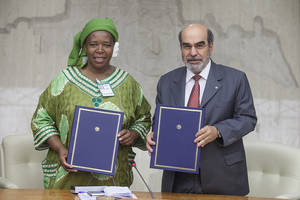FAO, La Via Campesina sign Landmark Agreement

04/10/2013
The Food and Agriculture Organization of the United Nations (FAO) and La Via Campesina, a smallholder farmers’ organization, have signed an institutional framework for the partnership between the two organizations and defined proposals of collaboration in areas of common interest.
The agreement marks a milestone in the partnership between FAO and civil society organizations, FAO says, as La Via Campesina is the movement that brings together the largest number of small-scale food producers on the planet. The agreement, concluded within the framework of a meeting at FAO headquarters in Rome, is part of the new FAO Strategy for Partnerships with Civil Society Organizations, which aims to strengthen ties with social movements, member-based organizations and NGOs that share the goal of eradicating hunger, malnutrition and food insecurity. With this gesture, FAO also recognizes the work of La Via Campesina in coordinating the voices of small food producers worldwide and in their efforts to build societies free of hunger and malnutrition, based on solidarity, equity and social justice.
“This exchange is important because FAO allies itself with a movement representing over 200 million farmers around the world and we join forces with a network that tries to innovate on many fronts to extend the right to food to everyone,” said Graziano da Silva, FAO Director-General. In his address, the Director General added that he believes that FAO and La Via Campesina have the same goal and that they are all convinced that small-scale farmers are part of the solution to hunger.
On her side, La Via Campesina’s General Coordinator Elizabeth Mpofu Mpofu, who is also the Vice Chaiperson of the Eastern and Southern Africa Farmers’ Forum (ESAFF) declared: “It has been a long journey and we are very happy to be here today. La Via Campesina defends food sovereignty and small agro-ecological farming and I think the collaboration initiated today will change many things”.
The October 4th meeting, during which the signing took place in Rome, Italy, was a continuation of talks initiated in Jakarta, Indonesia, last May, in which Graziano da Silva and the international delegation of La Via Campesina discussed ways to strengthen the links between FAO’s work and the cause of the movement. On that occasion, the two established that cooperation in areas of common interest would be formalized through the exchange of letters.
La Via Campesina is one of the largest international social movements. It brings together more than 200 million small-scale farmers and producers, landless farmers, women, youth, indigenous people, migrants and agricultural workers from 164 organizations in 79 countries worldwide. The network, an autonomous and independent movement, defends small-scale sustainable agriculture as a way of promoting social justice and dignity.
FAO will support the effective participation of La Via Campesina in political processes at different levels and promote dialogue for designing sustainable local initiatives, projects and emergency interventions. This partnership is based on knowledge sharing, dialogue, policy development and cooperation in normative activities. It will also discuss various issues of mutual interest including those related to land, seeds and agro-ecological practices of small-scale farmers.
Regional leaders of La Via Campesina from Mozambique, Italy, India, South Korea, Niger, Nicaragua, Canada, Romania, Spain and Argentina also attended the meeting.
During her visit to FAO Headquarters, Mpofu and other regional leaders also took part in a session entitled “Dialogues with Civil Society: A Conversation with La Via Campesina “, which among other issues addressed the role of women and youth in agriculture and discussed the priorities of the movement in synergy with policies and strategies promoted by FAO.






















